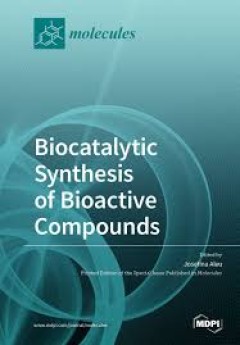Filter by

Biochar as Soil Amendment: Impact on Soil Properties and Sustainable Resource…
Agriculture has changed dramatically due to mechanization, new technologies, and the increased use of chemical fertilizers. These factors maximize production and reduce food prices, but may also enhance soil degradation. Sustainable agricultural practices include altering crop varieties and the use of soil amendments to increase production, improve irrigation, and more effectively use ferti…
- Edition
- -
- ISBN/ISSN
- 9783039282753, 9783039282746
- Collation
- 252
- Series Title
- -
- Call Number
- -

Bioceramics, Bioglasses and Gels for Tissue Engineering
Metallic materials such as stainless steel (SS), titanium (Ti), magnesium (Mg) alloys, and cobalt-chromium (Co-Cr) alloys are widely used as biomaterials for implant applications. Metallic implants sometimes fail in surgeries due to inadequate biocompatibility, faster degradation rate (Mg-based alloys), inflammatory response, infections, inertness (SS, Ti, and Co-Cr alloys), lower corrosion…
- Edition
- -
- ISBN/ISSN
- 9783036594958, 9783036594941
- Collation
- 274
- Series Title
- -
- Call Number
- -

Biocatalytic Synthesis of Bioactive Compounds
8-Hydroxydaidzein (8-OHDe), an ortho-hydroxylation derivative of soy isoflavone daidzein isolated from some fermented soybean foods, has been demonstrated to possess potent anti-inflammatory activity. However, the isoflavone aglycone is poorly soluble and unstable in alkaline solutions. To improve the aqueous solubility and stability of the functional isoflavone, 8-OHDe was glucosylated wit…
- Edition
- -
- ISBN/ISSN
- 9783039435715, 9783039435722
- Collation
- 142
- Series Title
- -
- Call Number
- -

Biocatalytic Applications in Biotechnology
Rhododendrol (RD) is a naturally occurring phenolic compound found in many plants. Tyrosinase (Ty) converts RD to RD-catechol and subsequently RD-quinone via two-step oxidation reactions, after which RD-melanin forms spontaneously from RD-quinone. RD is cytotoxic in melanocytes and lung cancer cells, but not in keratinocytes and fibroblasts.
- Edition
- -
- ISBN/ISSN
- 9783036562650, 9783036562667
- Collation
- 244
- Series Title
- -
- Call Number
- -

Biocatalysis: Chemical Biosynthesis
The broad interdisciplinary nature of biocatalysis fosters innovation, as different technical fields are interconnected and synergized. A way to depict that innovation is by conducting a survey on patent activities. This paper analyses the intellectual property activities of the last five years (2014–2019) with a specific focus on biocatalysis applied to asymmetric synthesis
- Edition
- -
- ISBN/ISSN
- 9783036512303, 9783036512310
- Collation
- 156
- Series Title
- -
- Call Number
- -

Biocatalysis and Pharmaceuticals: A Smart Tool for Sustainable Development
: Chondroitin sulfates are linear anionic sulfated polysaccharides found in biological tissues, mainly within the extracellular matrix, which are degraded and altered by specific lyases depending on specific time points. These polysaccharides have recently acquired relevance in the pharmaceutical industry due to their interesting therapeutic applications
- Edition
- -
- ISBN/ISSN
- 9783039217083, 9783039217090
- Collation
- 176
- Series Title
- -
- Call Number
- -

Biobased Polymers for Environmental Applications
In this work poly(lactic) acid (PLA)/poly(butylene succinate-co-adipate) (PBSA) biobased binary blends were investigated. PLA/PBSA mixtures with different compositions of PBSA (from 15 up to 40 wt.%) were produced by twin screw-extrusion. A first screening study was performed on these blends that were characterized from the melt fluidity, morphological and thermo-mechanical point of view
- Edition
- -
- ISBN/ISSN
- 9783036576695, 9783036576688
- Collation
- 196
- Series Title
- -
- Call Number
- -

Bio-Based Polymers for Engineered Green Materials
Chemical modification of wood with green modifiers is highly desirable for sustainable development. With the aim of enhancing the water resistance and dimensional stability of fast growing wood, modifications were conducted using renewable and toxicity-free industrial lignin combined with heat treatment
- Edition
- -
- ISBN/ISSN
- 9783039289257, 9783039289264
- Collation
- 568
- Series Title
- -
- Call Number
- -

Bio-Based Polymeric Films
Polymeric nanocomposites have received significant attention in both scientific and industrial research in recent years. The demand for new methods of food preservation to ensure high-quality, healthy foods with an extended shelf life has increased. Packaging, a crucial feature of the food industry, plays a vital role in satisfying this demand
- Edition
- -
- ISBN/ISSN
- 9783036559384, 9783036559377
- Collation
- 188
- Series Title
- -
- Call Number
- -

Bio-Based Materials: Contribution to Advancing Circular Economy
Polymer composites with different reinforcements have many applications. By adjusting process settings and adding fibers and fillers, composite properties can be improved. Additive manufacturing is popular in the polymer industry because it can manufacture intricately designed parts with fewer defects and greater strength with less material consumption
- Edition
- -
- ISBN/ISSN
- 9783036560472, 9783036560489
- Collation
- 252
- Series Title
- -
- Call Number
- -
 Computer Science, Information & General Works
Computer Science, Information & General Works  Philosophy & Psychology
Philosophy & Psychology  Religion
Religion  Social Sciences
Social Sciences  Language
Language  Pure Science
Pure Science  Applied Sciences
Applied Sciences  Art & Recreation
Art & Recreation  Literature
Literature  History & Geography
History & Geography